Di Slaney wins Write Out Loud’s ‘Echoes’ competition with ‘Dolly Parton’s wig’ - in memory of a ‘dear friend and inspiration’

Di Slaney has won Write Out Loud’s 20th anniversary ‘Echoes’ poetry competition with her poem ‘Dolly Parton’s wig’, written in memory of the late poet Kathryn Bevis, who died last year from cancer two months after publishing her first collection, The Butterfly House, with Seren. Our competition judge, Neil Astley, editor and publisher of Bloodaxe Books, said Di Slaney’s winning poem was “a fitting tribute echoing a poet loved by many – formally inventive and full of surprises like the poems Bevis wrote over the two years she had left after her diagnosis, its butterfly imagery fluttering between the figures of Dolly Parton and her love song ‘Butterflies’ and Kathryn Bevis, whose only collection’s title-poem ‘The Butterfly House’ recalls butterflies (‘their too short lives’) seen at and after the death of a dear friend she had sat with.
Neil Astley added that it was "fitting also in that Kathryn Bevis was known for the great love and generosity she showed friends and family, and this poem is very much about ‘finding light in the dark, celebration in sadness, and joy in the smallest moments’ (words used by Seren’s Rhian Edwards and Zoë Brigley in their own tribute to Bevis). The author of ‘Dolly Parton’s wig’ could have been any one of Kathryn Bevis’s numerous poet friends wanting to remember her so fondly and so much in her style. Having picked the poem as winner of the competition, I learned that this honour went to Di Slaney, who’d had the rare privilege of receiving the gift of the poem from Kathryn telling her she “felt the spirit of Dolly” through wearing the flouncy wig after losing her hair, whereupon Dolly is glimpsed behind her like a butterfly, “small and perfect … the tiny velvet bow all cute and perky”.
Di Slaney lives on the edge of Sherwood Forest in Nottinghamshire where she runs livestock sanctuary Manor Farm Charitable Trust and independent publisher Candlestick Press. She was the winner of the Plough poetry prize 2022, Slipstream Open 2023, Four Corners 2015 and Brittle Star 2014 poetry competitions. She won second prize in the McLellan English poetry competition 2024. Her poems have been broadcast on BBC Radio 4, widely anthologised, and highly commended in the Forward prize 2016 and Bridport prize 2020. Journal publications include Poetry Wales, Popshot, Magma, The Rialto, The Interpreter’s House, Iamb, Raceme, Brittle Star, Long Poem Magazine, Humana Obscura, Modron Magazine, Aimsir, The Alchemy Spoon and Ambient Receiver. Her collections Reward for Winter and Herd Queen are available from Valley Press, along with pamphlet January Conversations, with Dogs. She is Poet in Residence at Nottinghamshire Local History Association.
Di Slaney said of her winning poem: “I’m especially pleased to have won the competition with this poem dedicated to dear friend and poetry inspiration, the late Kathryn Bevis. I wrote the poem on a retreat tutored by Jonathan Edwards for the Writing School Online, Kathryn’s wonderful gift to the poetry writing community. Kathryn was part of the programme despite undergoing chemotherapy at the time, and one of our discussions was about her preparation for the Forward prizes where she would be reading her shortlisted poem wearing a beautiful long red wig. We joked about channelling the spirit of Dolly Parton in that glorious wig, and this was the catalyst for the poem which I was able read to her at the end of the retreat. People like Kathryn – generous, brave, funny, brilliant, full of love and optimism for the world – are rare gems indeed, and we’re lucky if we get a chance to keep their echoes alive, sharing their positivity and keeping them close to us. Like many people, I miss her very much. I hope she’s pleased with this win.”
DOLLY PARTON’S WIG
by Di Slaney
for Kathryn Bevis
And when you said you felt the spirit of Dolly
in that gorgeous sweep of auburn light falling
past your shoulders, your warm bright smile so wide
and clear despite every shitty current thing, Dolly
appeared behind you, small and perfect, Dolly
in curly backcombed bombshell, the tiny velvet
bow all cute and perky, guitar slung low across
tasselled skirt, humming, long lacquered nails Dolly
uses as instrument and reward, tapping you, Dolly
inviting you, sing with me, make our butterflies
and love a real and gentle thing, now your voice
deep and rich, a little quiver reassured by Dolly
squeezing your shoulder, her voice sweet, high Dolly
with tall notes vibrating to let us know you’ll think
of us every step of the way, leaving us your words,
your glorious voices, your libraries of imagination.
Second prize – Esther Lay
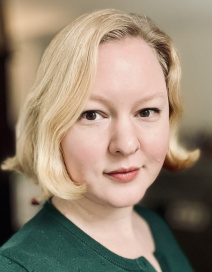
“Her other poem ‘Witness’ takes the first four words of WS Merwin’s four-line poem ‘Witness’ (I want to tell …’) – an imagined future memory of life after climate change recalling the world as it had been – and takes off into an evocation of another life-changing but now vanished time, that of a mother finding herself in another time zone, that of living a 24-hour day with newborn babies. Both poems are sensually rich, every phrase or image on heightened alert to the five senses: sight, smell, hearing/sound (echoes!), taste and touch.”
Esther Lay is a 2025 Forward prize nominee for Best Poem (Written) for ‘The Performance’, which won the 2024 East Riding Festival of Words poetry competition. She is also the winner of the 2024 Write By The Sea poetry prize. She was shortlisted for the Plaza prizes 2025, placed third in Trio International 2024, and fourth and sixth in the Plaza prizes 2024. She has been shortlisted twice for the Bridport prize and longlisted for the Fish prize and Canterbury Festival Poet of the Year. She has had work published recently in Allegro, The Waxed Lemon, The Ghost Furniture Catalogue, Grain Magazine, Broken Spine spring 2025 anthology, and Thimble Literary Magazine.
Born in California, and brought up in Beijing, Singapore, and Sydney, Esther’s Mid-western hometown is Olney, Illinois. She read philosophy and theology at Queen’s College, Oxford, and trained as a classical singer at the Royal Academy of Music in London. After a distinguished 10-year career as a concert soloist specialising in baroque repertoire (under the name Esther Brazil), she trained for priesthood at Ripon College Cuddesdon, where she began writing poetry in 2020. She served her curacy at St Mary Magdalen, Oxford, from 2021-24, where she was the first woman in a thousand years to hold the post. She is now Rector of Wootton, in West Oxfordshire, where she lives with her husband Ben, a serving officer in the Royal Navy, and their two small children.
Esther said: “I'm astonished to have been rather surreally awarded joint second with myself in this splendid competition, judged by one of the great poetry editors of our time. It's given me the chance to put these poems side by side and think about them in dialogue with each other: they are both, in different ways, about the way memories from childhood cling to us and echo into our adult understanding of ourselves.
“My own childhood took the shape of four years in Beijing, aged five to nine, and four years in Singapore, aged nine to 13. The strangeness of being a little blonde girl growing up in a very recently post-Tiananmen-massacre Beijing was not lost on me, but I felt deeply at home in China, and still miss it very much.
"Childhood's most potent memories, whether those of our personal experience or the early years of our own children, are so often tied to food, and in both poems I recall this: in ‘Jidan’, the taste of a winter treat mixes with the taste of polluted air, such a hallmark of 1990s Beijing, and then the memory of breastfeeding my own babies in ‘Witness’. The physicality of ‘Jidan’ is about punishment at school in Singapore, and the physicality of ‘Witness’ is the memory of another kind of physical exertion: the heavy bodily stillness of being with a baby in that strange newborn landscape.
“Both poems, in different ways, are about escaping the past, too - trying to establish an identity as a westerner who still doesn't quite fit properly in the west because of my upbringing, and realising that those seemingly endless months and years of my children's babyhood are now over, and moving into an era of movement and noise.
“Form has always been very important to me. In ‘Jidan’, the poem is written in conversational contemporary language, but the single reference to Shakespeare’s sonnets in the middle is an Easter egg: the whole poem is in a slightly sneaky but deliberate iambic pentameter, like a traditional sonnet or Shakespearean speech, except for the last line. This has three stresses instead of five, to show that the chicken will come out of the egg, inevitably, that identity is more complicated than just what we want it to be.
“We are inevitably shaped by what we leave behind, no matter how fast we run away from it. And to move forward in one's life, even with strong echoes such as these, is to experience a kind of loss, but the privilege of being able to keep moving through time, of having the loss in the first place, is enormous, and I am so grateful to have had a life that has been multicultural and multi-faceted, and to be able to continue to watch this life unfold as I age. Poets work best when we are strangers in the world, and the great secret is probably that everyone has a chance to be an outsider, because everyone is a newcomer to their own present day.”
JIDAN
by Esther Lay
Banana (xiangjiao): yellow on the outside, white on the inside
Chicken egg (jidan): white on the outside, yellow on the inside
Chicken egg: a slur made up for me.
By six, I had scant memories of the west:
instead, the taste of Beijing coal in winter
air, breath visible, skating on foot-thick
ice on the summer palace lake, hot chestnuts
to warm my hands, crab apples’ candied crunch.
My brothers and I flew kites in the high spring winds
in Tiananmen before it was illegal,
played in dusty parks where old men sawed
at erhus, did taichi, their wives on bound feet
teetering past. In Singapore, I read
the Shakespeare sonnets underneath my desk
in moral education class, was punished
till I couldn’t walk. My protest was
to imagine Europe, become high-church, high-culture.
But no matter the gallery or cloister,
I could always hear it: scrabbling on marble
to catch up, skidding round each corner.
The little chicken from inside the egg:
tapping, tapping, tapping.
WITNESS
by Esther Lay
after WS Merwin
I want to tell the weight of a newborn
on the chest, the stink of milk-soaked clothes,
of murmuring lonely days in bed
and box sets full for breastfeeding.
But that world vanished, and its fluttering
stillness. The noise is bright now,
clattering, children eight and five,
and wheels on things that matter.
My hard-won silences long, solid,
heavy with their unbroken sleep.
Third prize – Mary Mulholland and Tracey Martin
Joint third in our competition were Mary Mulholland and Tracey Martin. Neil Astley said: “It seemed unfair that only two poets could win this year’s top prizes, so I asked if Esther Lay’s two poems could share second prize, making it possible for another poet to win third prize, but that presented another dilemma: I found I couldn’t choose between Mary Mulholland’s ‘Writing Sisyphus’ and Tracey Martin’s ‘A better door than a window’, both highly moving in their different ways, each carrying echoes of past trials and tribulations: the last line of ‘Writing Sisyphus’ ending with the still hopeful ‘don’t ever give up’ echoing ‘don’t give up’; while ‘A better door than a window’ ends with the title phrase being spoken by the intemperate volatile father to the quietly enigmatic mother, a phrase which sets off echoes back through a poem about a woman who was always present but held back at the same time.
“I was delighted when Write Out Loud agreed to my request that Mary Mulholland and Tracey Martin might share third prize. That gave us five winning poems and five highly commended poems, which seemed a fair balance from my overall selection of 10 really strong poems of an even higher standard than the next tranche of excellent contenders whom I had to disappoint in the end. When you are reading anonymously submitted poems, you end up reading and re-reading a small number of poems many, many times, trying to work out – with nothing known about the writers – how the particular qualities of some poems impress you more and more with each reading, and so it was that I ended up with 10 poems that I felt deserved to be recognised and read by other readers - five as winners, five to commend highly.”
Mary Mulholland – ‘Writing Sisyphus’
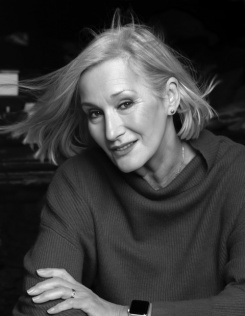
She said of her poem: “It came from a comment in a poetry workshop that I 'needed to be more angry'. This got me thinking about how hard it can be for quieter/ more subtle voices to be heard, yet how important it is, in this world full of contractions, to write authentically, and to hang on in there, with Sisyphus and Beckett as mantras. Was so happy this was awarded joint-third place!”
WRITING SISYPHUS
by Mary Mulholland
Perhaps even fish dream of breakthroughs
when they can't see the sky for the crowding
of waterlilies, and the pink flowers scream
as they close their ballgowns by night.
The others say my poems need more anger.
But I've lived in warzones. Ordinary people
do ordinary things to a backdrop of gunshot.
And I remember the nuns. Me chewing cabbage
because somewhere someone was starving.
Can't storms and gentle rain both tell stories?
I tell myself it's just a question of waiting.
A lifetime of waiting.
Watching the army padre's red-haired boys
climbing the hill. They carried satchels
like tortoises on their backs. I wanted a tortoise
but had to spend my days in a playroom
until my sisters came back from school.
The boys each held a hand of their mother,
a pale freckle-faced woman. My mother was dark
haired with red lips. She gave me buttons.
Time stands still when you wait, and words
from a heart may alter nothing, yet need to be
written, as a great ball of hope is rolled up the hill,
ears strain to hear, don't give up, don't ever give up.
Tracey Martin – ‘A better door than a window’
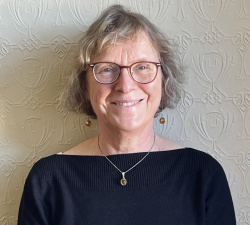
“I'm particularly drawn to poems that contain stories, even if they are quite short. At the moment I'm working on a series of poems about textiles - which I love and am fascinated by - inspired by the podcast Haptic & Hue. Textiles, like poems, contain stories and tell us about the human condition.
“ 'A better door than a window' was written on a poetry course with the wonderful Jonathan Edwards at the Garsdale Retreat. I've always been drawn to the phrases used in speech that are like verbal pictures, especially those used in my own family. When I read the poem I can still see my mum hoovering and my dad saying these words. Since they died a few years ago, I have realised how little I knew about them really, especially my mum. This poem grew out of those reflections.”
A BETTER DOOR THAN A WINDOW
by Tracey Martin
We always knew you loved her. Even on the days
you threw your Sunday dinner in the bin,
stormed out the house and left us all
crying into the gravy.
You always sent us out to buy her cards:
birthday, anniversary, even Valentine.
We knew she liked a verse. You’d sign
in capitals ‘from your cuddly bit’.
She never called you that, at least
not in our hearing, her hugs
she saved for children, anyone’s,
her kisses for the tops of babies’ heads
And when at parties, high on bitter,
you held her close, she’d say
‘give over’ and shrug herself away
to do the washing up.
She kept her secrets tight, hard to know
what she even liked and what
she pretended to, her busyness
the wall she built around her.
Some part of her she never gave away.
Anne, you’d say, as she hoovered
in front of the telly,
you make a better door than a window.
HIGHLY COMMENDED POEMS
(in alphabetical name order)
Sean Burke – ‘Naming’
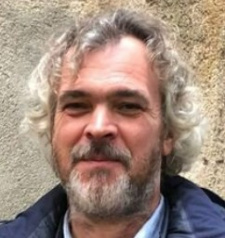
He read philosophy at the University of Aberdeen and was awarded an honours degree and a postgraduate certificate; after a brief stint in a call centre in Glasgow, he moved to Milan, Italy, where he worked as an ESL teacher and studied jazz and drumset at the Civic School of Music and Cinema, gigging regularly, if not profitably. For the last eight years, Sean has been a primary and middle school teacher of all core subjects at a bilingual school, with a recent focus on music and drama. He has adapted Dante’s Commedia and The Odyssey for stage performance at early secondary level, as well as arranging a piece of ancient Greek music for a large ukulele ensemble.
His poems have appeared in Orbis, Cake, Squawk Back and Poetry Worth Hearing, and have been shortlisted in a number of international competitions, including Poetry on the Lake and the Hedgehog pamphlet award. He is the winner of the Molecules Unlimited 2025 prize.
“This poem began when I was reading my daughter a story and I was struck by how we still feel the need to teach children the names of animals, despite our ever-increasing distance from the natural world. I am interested in the idea of language as a means of imposing control on experience, which would otherwise be alien and shocking, and how we still seek to reach the raw being of things beyond words while simultaneously backing away from it: the need for, and fear of, communion. These themes are bound up with echoes of stories from the Old Testament, which made a profound impact on me as a child.”
NAMING
by Sean Burke
I.
Look. This is the world and what is in it.
Listen. Elephant, lion, flamingo, snake.
Now you try.
At first, the mouth will not bend to these sounds
but once mastered, hear how they call
their bodies like lost souls,
see, like lost souls, those bodies appear.
I give you this gift as I received it,
with no memory of the cost -
each syllable a rudiment of power,
each name fathered by fear.
II.
Dawn in the clearing. One by one they entered,
circling their pale and naked half-brother,
all soundless but the birds scattering
in a percussion of wings.
A held breath,
then the cries of each after its own kind
and something summoned from the earth,
from feet to gut, from gut to throat,
then out, up and out, spreading like branches –
my first word, my truest name,
lost before and since; a voice
rising to meet the light,
restoring the silence.
III.
Once upon a time there was a gardener
and this gardener was also a namer of things
(for without names there is only chaos
and no garden can be where chaos is) -
so he named his garden out of chaos
and the name he gave you and me
was the same name he gave the soil,
that from which other things grow.
But now he had mastered his garden
there followed a kind of paralysis
and he thought, There is something missing,
something in the chaos that was
that is missing. It is, perhaps, a sense of urgency
not to be found in the orderly seasons,
in my obedient and contented creatures.
Once upon a time there was a snake
Jon Hart – ‘Float’

For Jon, writing is an important release from the demands of work (where written communication carries a different kind of weight). With his sixth decade starting to appear on the horizon, he nonetheless regards himself as still at the start of the poetry trail and remains continually surprised by the different emotions that patterns of words on a page in skinny books are capable of producing.
Key themes that he has been exploring include looking at memory, and our complicated and unresolved relationships with the past. He’s at his happiest near or in water: camping on St Agnes in Scilly, walking on Cornish cliffs, swimming year round off Devon beaches or in Dartmoor rivers and pools, mulling over the next line.
FLOAT
by Jon Hart
At this time of pre-dawn, the grey light is rich
in potential, with, say, a south-westerly breeze
and the prospect of infinite sky, or else a fog rug
hemmed by the river valley with grey until noon.
The mind anticipates a sound unheard for twenty years:
the electric hum and glass bottles of Ray about his rounds,
then, in the pause before the radiator’s metallic tick,
imagines echoes of other sounds, maybe not there:
children not grumbling awake in the room above,
tired house guests not shuffling on the dark landing.
Next, before the day begins, rest, let memory think
things are as they were, foolish acuity still intact.
Go, glide from bed, drift downstairs. The dark hall.
The front door left open to a silent street. The empty step.
Paul McMahon – ‘Lake Michigan’

LAKE MICHIGAN
by Paul McMahon
As I went outside and looked across Lake Michigan
the February rain in seconds numbed the skin on my face
while the winds ran through the trees surrounding the cabin
like wolves at the end of a bad winter when the only taste
of blood they remember is the old and the runt of the litter
and the sky overhead was plummeting to level the earth
as I ran back inside, barred the door, and twisted the dead
lock into the frame as I’d do back during the Troubles
when the sound of screeching tyres corralled rioters
into the open wasteground at the back of our house
and I’d shut the curtains and hit the deck as they sped
up the back path – the rioters and the armoured police jeeps –
like the hail-filled winds that blew in off Lake Michigan,
the echo of them battering the ground the way the police
battered those rioters trapped in the dead-end outside
our kitchen window back in Belfast – their howls the same
as those winds that ran through the trees, all teeth and no lips,
at the dead-end of winter, when the only taste of blood
the hunter wants is the old and the runt of the litter.
Ilse Pedler – ‘Retracing’

“My poem ‘Retracing’ is part childhood memory of being brought up by strict parents in a house that always seemed to be on their side and part imagining what it must be to live in a darker more menacing environment.”
RETRACING
by Ilse Pedler
Take my hand –
is that how stories begin,
the warmth of a palm
as armour to remembering?
Step onto the brown and orange vinyl,
look right – do you see the breakfast table
with its fake wood top that tilted?
Which side did you sit?
I can’t remember you there,
I can’t remember any of us sitting together.
Walk forward three paces,
look left through the frosted glass
at the blur of the living room,
check for the shape
shift of bodies beyond.
Slide the door open,
do you remember the rumble it made as it moved,
however gently we tried,
like it was clearing its throat before an announcement?
On the left, the polished dining table with its lace tablecloth,
the glass cabinet with the good china,
on the right, the high back of the red Dralon sofa.
Is that your heart beating faster,
are your eyes, like mine, flicking
to the upstairs door,
are you measuring the steps,
four or five at most,
do you remember how hurrying on the sprung floorboards
set the china rattling its teeth
grinning its grin,
are you making yourself
insignificant?
Hold your breath
I am behind you,
we are nearly there
reach out your hand
trembling is allowed now
feel the white plastic handle
turn it.
Turn it.
Thea Smiley – First Migraine’
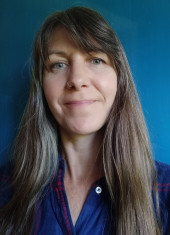
Her work has previously been shortlisted in the Live Canon Collection competition and the Bridport prize, longlisted in the Rialto Nature and Place competition, and commended in the Hippocrates Prize, Poets and Players, and Ware Poets competitions. Her poems have been published in magazines including The Alchemy Spoon and Butcher’s Dog, and in anthologies from Renard Press, the Wee Sparrow Press, and Arachne Press.
She was recently chosen as a recipient of The Literary Consultancy’s Free Reads Scheme in partnership with the National Centre for Writing and funded by Arts Council England, and is working on a pamphlet and debut collection.
‘First Migraine’ describes the disorientating moment when, as a teenager, she experienced her first attack. Although infrequent, these debilitating headaches have continued throughout her life, and she is interested in exploring the condition through poetry.
FIRST MIGRAINE
by Thea Smiley
Thigh-deep in the pool, skin rising into goose pimples,
I squint as my mother slips into her element
and is off, trailing a silky ripple, leaving me blinking
in her wake, as sun pours through skylights
like molten metal, dazzles across the surface, reflections
shimmering over the tiles in shoals, and the air
echoes with voices, clatters with slaps and splashes,
shouts rebounding off hard surfaces.
I edge in deeper, flinching as the cool water inches up,
slops against me, darkens my swimsuit.
I keep my arms close to my chest to warm my body,
hold my breath against the stench of chlorine,
which stings my nose and brings back the image
of a green sea, a drowning figure
floundering in a poem studied just the year before,
the horror of young men blinded, blood-shod.
I push through the water towards my mother
on the far side, her cupped hands scooping
a clear path through sunlight, soft waves yielding
before her, lapping at her chin, her lips.
I stand, unable to duck down, dip my shoulders in,
or lift my feet to float, as the lights begin
to descend, hang like a curtain, its geometric pattern
sparkling, eclipsing sight in my right eye.
Shrieks echo as bodies puncture the viscous liquid,
small limbs leap and curl into falling bombs,
a whistle stabs through my skull, a shout rings out
like a bullet, and I am swaying, sea-sick,
stumbling in the shallows, as my head starts to thud
like the boots of an approaching army.
Write Out Loud is preparing an anthology containing the winning, highly commended, and other poems from the competition. Look out for more information about the anthology in due course.
PHOTOGRAPH OF MARY MULHOLLAND: XAVIER BONFILL
PHOTOGRAPH OF ILSE PEDLER: CLARE PARK
Background: Meet Neil Astley, celebrated Bloodaxe editor - and our competition judge






Robert Mann
Sun 1st Jun 2025 20:58
I think I must be missing something - almost a thousand pieces entered and these are the chosen few? How bad must the others have been?